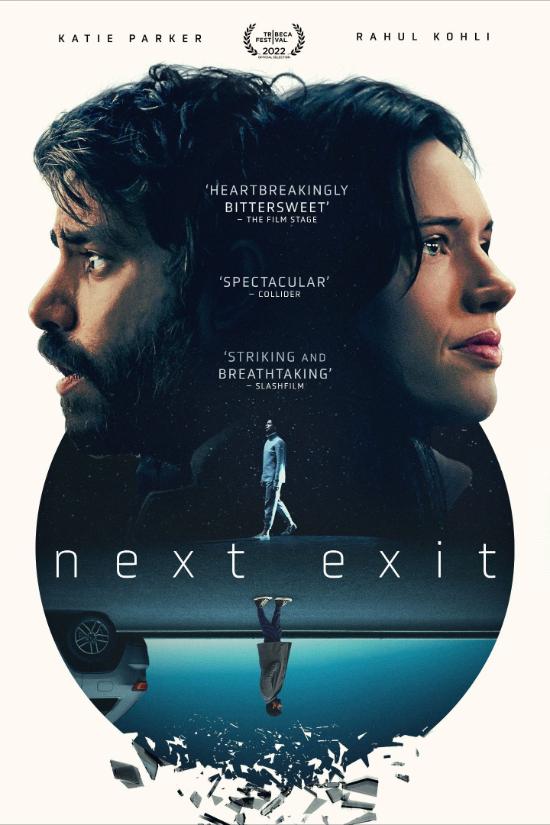Proof of life after death raises questions about life before death.
The afterlife might be real, but you’re still going to have to sit in traffic to get there. That’s the quietly brutal joke of Next Exit, a contemplative science fiction road movie that treats death not as a mystery to solve or a horror to escape but as a destination with paperwork, waiting lists, and just enough small talk to make you question your commitment to the plan. If Children of Men had hope, or The Leftovers had a bureaucratic arm, it might have looked something like this: haunted, sardonic, and gently speculative.
Mali Elfman, making a remarkably assured debut behind the camera, doesn’t build her world in spectacle or lore dumps but in implication and disquiet. Humanity has apparently cracked the enigma of what happens when we die, thanks to an experiment by one Dr Stevenson (Karen Gillan, perfectly crisp and efficient), and the result is an orderly, government-adjacent programme called the Life Beyond Institute. You can sign up, have your consciousness monitored as you pass over, and apparently pop up again on the other side, waving cheerily from the great beyond. But Next Exit isn’t about that discovery. It’s about what happens to the living when death loses its sting.
Rahul Kohli and Katie Parker, both alums of Mike Flanagan’s mournful horror stable, bring a wearied warmth to their roles as Teddy and Rose, strangers paired together on a cross-country drive to their respective Life Beyond appointments. Kohli gives Teddy the kind of affable, wounded charm that hides a chasm of avoidance, while Parker’s Rose is brittle, guarded, and clearly dragging far more than her luggage. Their journey from New York to San Francisco becomes a slow unravelling of defences, grievances, and half-truths, conducted not under the threat of apocalypse but in the shadow of profound surrender.
The genius of Elfman’s approach is in how sparingly she uses her speculative premise. Ghosts appear, but not with bombast or fanfare. They slip into frame like memories you’d rather ignore. There’s no grand metaphysical theory being peddled, no cheap thrill in peeking behind the veil. Instead, Next Exit is consumed by the question: if death is no longer the end, what are we still so afraid of? And worse, what does it mean if we’re not afraid at all?
This is a film about endings that, ironically, spends all its time asking how we carry on. It deals in emotional residue more than exposition, with cinematography that lingers like doubt and a score that never oversells the mood. Even its rare moments of levity feel earned through tension rather than quirk. You get the sense that every roadside diner and motel room is saturated with stories like these – people who can no longer reconcile the life they have with the one they were promised.
It’s tempting to call Next Exit a ghost story, but the most haunted thing in it is the human heart. Teddy and Rose aren’t just fleeing their lives; they’re mourning them in advance, grasping for meaning in a world that just made dying banal. The film doesn’t dwell on suicide as shock or pathology. It treats it with a disarming matter-of-factness that feels less like resignation and more like unease at how bureaucratised despair has become.
And yet, for all its morbidity, the film is stubbornly humane. It believes, quietly but resolutely, that connection is possible even at the terminus. Kohli and Parker build a chemistry that resists convention, their tentative rapport never collapsing into formulaic intimacy. There are moments of grace, discomfort, and occasionally cruel honesty, but never manipulation. The journey matters not because of where it ends but because of who they become along the way. Not better, not cured – just seen.
Elfman resists the temptation to turn Next Exit into an allegorical lecture. Her characters are messy, contradictory, and deeply recognisable. The film touches on trauma, guilt, cultural expectations, and the low thrum of grief that modern life tries so hard to ignore, but it does so with a gentleness that never becomes maudlin. Even its darkest turns arrive without dramatic punctuation. Just cause and effect, like everything else.
Some will find it too subdued, too slow, or not science-fiction-y enough. But that misses the point. Next Exit isn’t here to dazzle or diagnose. It’s here to ask what we do with our lives when all that’s left is the living. It’s not about the afterlife. It’s about the before-death. And what a quietly radical, heartbreakingly hopeful thing that is.
















